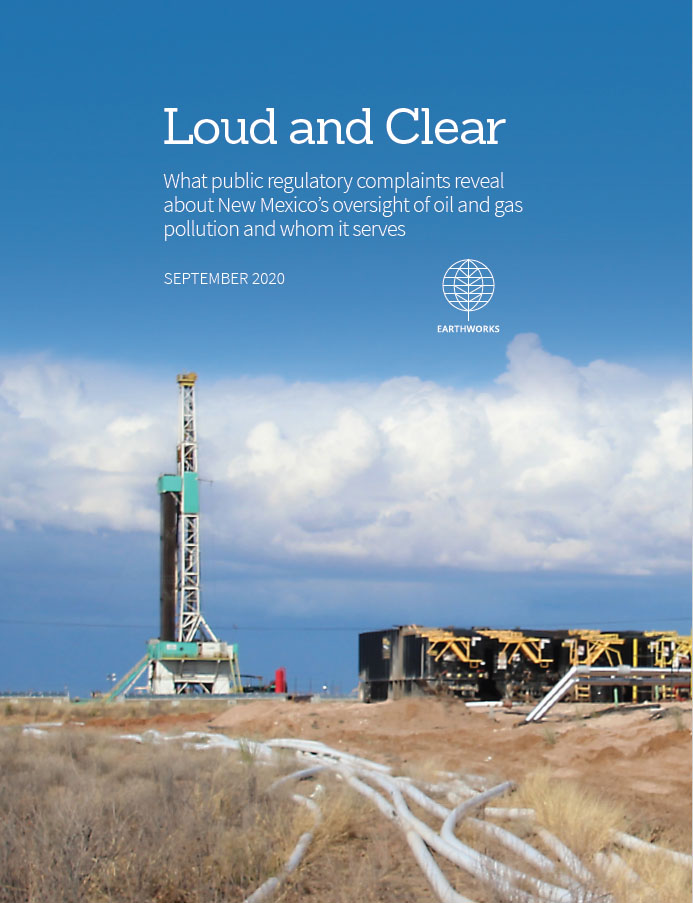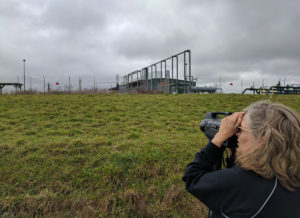The Oil and Gas Pollution Threat
The rapidly expanding oil and gas industry in New Mexico is releasing large volumes of greenhouse gases – despite scientific consensus that fossil fuel pollution must instead be greatly curtailed in order to prevent the most catastrophic effects of climate change.1 This includes methane, which is 86 times more powerful than carbon dioxide over a 20-year time scale.2
At the same time, air quality is worsening for the communities living near oil and gas operations. The main reason is increased pollution from methane and volatile organic compounds (VOCs), which science associates with a range of health problems.3
Yet despite these trends, policymakers (and the general public) continue to assume that state and federal governments have both the will and the resources to adequately oversee a complex and increasingly polluting industry. Years of research and field experience by Earthworks have demonstrated that this is not the reality on the ground.4
Currently, state regulatory and enforcement agencies are:
- Inconsistent and insufficient in how they respond to the public
- Primarily focused on issuing permits quickly
- Underfunded and short-staffed
- Subject to the political influence of the oil and gas industry
Documenting Pollution to Protect People and the Planet
Earthworks started Field Investigations because the oil and gas industry is putting people and the climate at risk – and agencies are failing in their responsibility to prevent that from happening.
Most air pollution from oil and gas operations is invisible, making it easy for companies and regulators to dismiss residents’ concerns. Earthworks’ certified thermographers use optical gas imaging (OGI) to make visible the pollution caused by intentional safety releases, equipment failures, and operator errors in oil and gas fields.
Field Investigators then use that OGI evidence to file regulatory complaints with relevant state agencies and to document gaps in how those agencies track and address oil and gas air pollution. It is a critical time to do so, with some states already committed to reducing oil and gas pollution and others moving in that direction.
This report details findings of Earthworks’ work in New Mexico from 2017-2020. (pdf)
Nearly all state regulatory agencies have a complaint system. If properly designed and implemented, residents can notify regulators about problems at oil and gas sites – being critical “eyes and ears” while gaining needed assistance from public agencies.
For oil and gas regulatory regimes to be effective – in both combating pollution and protecting the public – complaint systems must be accessible, usable, responsive, and transparent.
Robust complaint systems help to:
- Reduce pollution that harms health and the climate.
- Build trust in agencies mandated to both work with industry and serve the public.
- Respond to community concerns and experiences.
- Make government agencies more effective.
- Foster agency and operator accountability.
- SEI, IISD, ODI, Climate Analytics, CICERO, and UNEP. 2019. The Production Gap: The discrepancy between countries’ planned fossil fuel production and global production levels consistent with limiting warming to 1.5°C or 2°C. http://productiongap.org
- Gayathri Vaidyanathan, “How bad of a greenhouse gas is methane?” Scientific American, 2015. https://www.scientificamerican.com/article/how-bad-of-a-green- house-gas-is-methane/
- See database of peer-reviewed science on health impacts at https://www.zotero.org/groups/248773/ pse_study_citation_database/items/collectionKey/ SASKSKDG; and Concerned Health Professionals of New York, Compendium of Scientific, Medical, and Media Findings Demonstrating Risks and Harms of Fracking (Un- conventional Oil and Gas Extraction), Sixth Edition 2019. http://concernedhealthny.org/compendium/
- Breaking All the Rules: The Crisis in Oil and Gas Regulatory Enforcement. Earthworks 2012; Sharon Wilson, Lisa Sumi, and Wilma Subra, Reckless Endangerment While Fracking the Eagle Ford Shale. Earthworks 2013; Nadia Steinzor. Blackout in the Gas Patch: How Pennsylvania residents are left in the dark on health and enforcement. Earthworks 2014; Nadia Steinzor, Permitted to Pollute: How oil and gas operators and regulators exploit clean air protections and put the public at risk. Earthworks 2017; Nathalie Eddy, New Mexico’s Moving Ahead: Restoring the Oil Conservation Division’s Strength and Authority. Earthworks 2019; Nathalie Eddy, Putting the Public First: How CDPHE can overcome its legacy of prioritizing oil and gas interests ahead of public health, safety, welfare, and the environment. Earthworks 2020.


